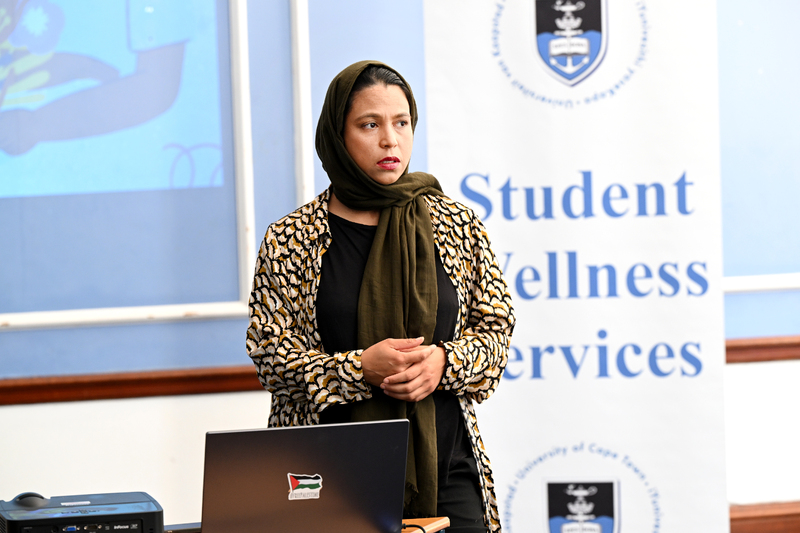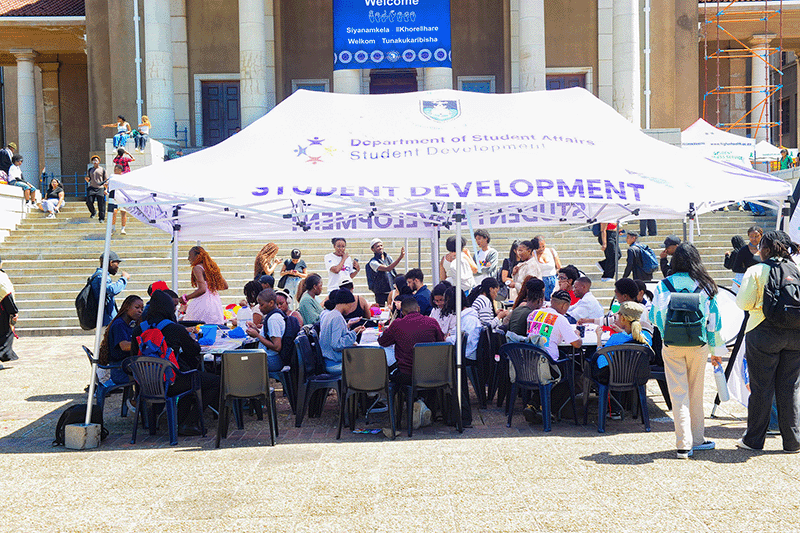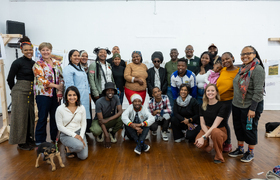Espousing transcultural mental health approaches
15 October 2025 | Story Kamva Somdyala. Photos Lerato Maduna. Read time 4 min.
The University of Cape Town’s (UCT) Student Wellness Service (SWS) commemorated World Mental Health Day on 10 October. Qaanita Rossier, a registered counsellor at SWS, delivered an address under the theme, “Transcultural Mental Health”.
To begin, an understanding of culture must be assumed, and then interrogated insofar as its effect on mental health goes. “There are different ways our cultural understanding expresses in how we look at our mental health, how they are diagnosed and how they are treated,” said Rossier.
“For me, this is a practice that should be non-negotiable in a context like South Africa because we have such multicultural backgrounds.” As a practitioner, she said, this understanding underscores that there is no one-size-fits-all approach to understanding and dealing with mental health.
Over three days, SWS, within the Department of Student Affairs (DSA) hosted numerous events and conducted several wellness stations on campus, including health screening, tuberculosis and HIV testing, mental health screening, as well as dynamic stress relieving techniques. There were also creative stations for painting, crocheting, knitting and beading.
The reason for the discussion from SWS’s point of view is that transcultural mental health begins with recognising that Africa’s challenges and its strengths require contextually grounded, African-led solutions. They have also started the indigenous health advisory services for inclusivity of mental health services and provision of holistic well-being of students.
“You also need to be aware of whether you are providing your body with its basic needs.”
Rossier continued: “The stigma around men seeking mental health treatment is something I see time and time again, but it forms part of a larger cultural problem in South Africa. It has been encouraging to see that South African psychology has embraced the idea of transculturalism – there’s a lot of integration and a blended healthcare team which people can be referred to.
“We are moving to a space where it is easier to find practitioners who represent you better, where in the past I think it was a bit difficult. Psychometrics is another area of psychology where we are developing better standards which are more appropriate to South Africans. That’s important because we use psychometrics in a diagnostic sense.”
At the same time, common challenges still exist across cultural settings. Things like transitioning to university, finding a new identity, homesickness, academic stress and financial difficulty, to name a few. All of these have a negative impact on the life of a person, and in particular, students.
State of mindfulness
There are ways to turn it around, however. “One could practice how it is that they check in on themselves,” Rossier said. “This is to ensure that at any given moment, you have an idea on how it is that you are feeling and doing. It’s wise to track your potential triggers and things that are stressing you. You also need to be aware of whether you are providing your body with its basic needs, and this is often the biggest clue that a student is dysregulated.”

One of the takeaways of the engagement was to ensure one has a reliable support system – especially at university. Other stress management techniques advised by SWS is how to reach a state of mindfulness, finding spaces to do relaxation exercises and time management.
SWS’ services include the main clinic at Ivan Toms Building, the Upper Campus clinic, counselling services, pharmacy services, and alternative resources.
 This work is licensed under a Creative Commons Attribution-NoDerivatives 4.0 International License.
This work is licensed under a Creative Commons Attribution-NoDerivatives 4.0 International License.
Please view the republishing articles page for more information.










